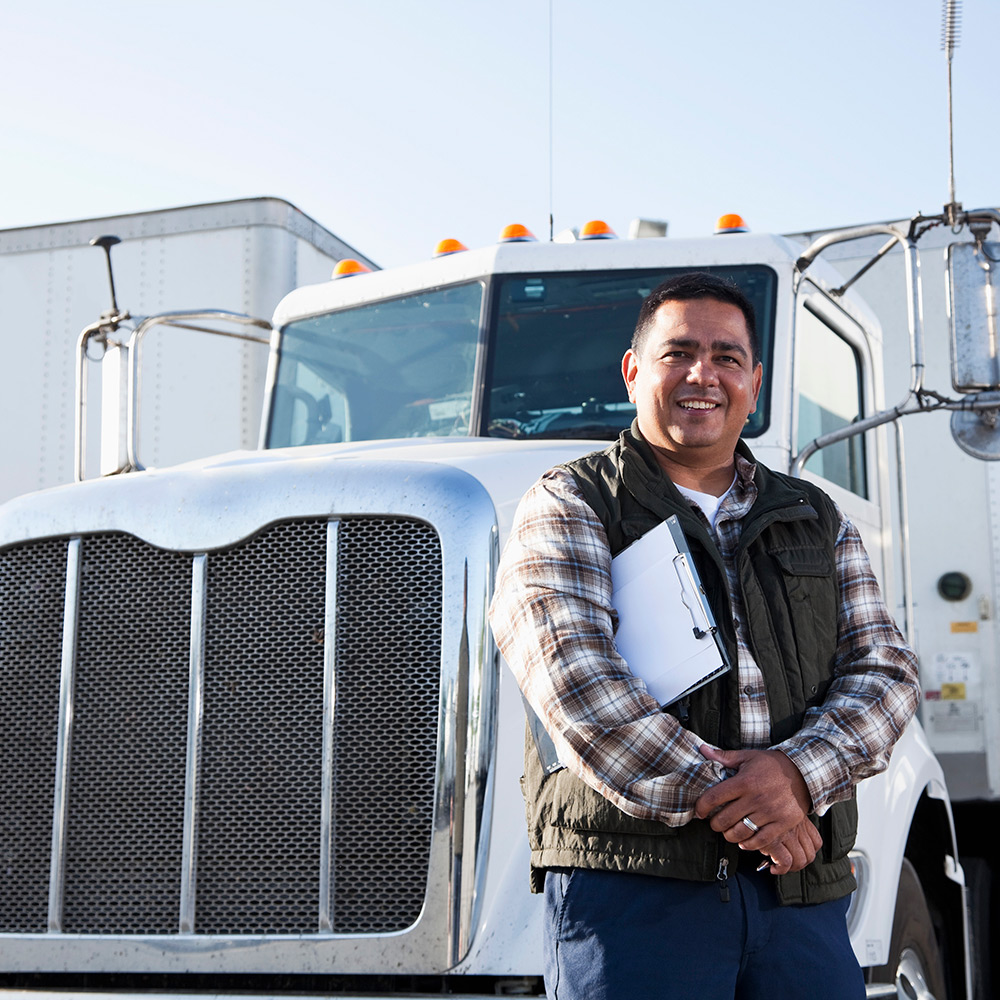Want to Be Your Own Boss? Here’s How to Become an Owner-Operator Truck Driver

Becoming an owner-operator truck driver is an appealing career path for those who want greater control over their work, earnings, and lifestyle. Unlike company drivers who work under an employer, owner-operators own or lease their trucks and run their trucking businesses independently. This role offers both freedom and responsibility—allowing drivers to set their schedules, choose their loads, and potentially earn significantly more than company drivers. This level of independence allows for greater earning potential but also comes with increased responsibilities.
Key Responsibilities of an Owner-Operator
- Freight Hauling & Delivery
- Owner-operators transport goods across local, regional, or national routes, either working under contract with a company or finding loads independently through brokers, load boards, or direct clients.
- Business & Financial Management
- Running an independent trucking business requires handling invoices, managing cash flow, and keeping track of expenses such as fuel, insurance, maintenance, and tolls.
- Compliance & Licensing
- Owner-operators must have the necessary licenses, such as a Commercial Driver’s License (CDL) and, if operating under their own authority, a Motor Carrier Authority (MC Number). They must also comply with Department of Transportation (DOT) regulations, which include safety standards, vehicle inspections, and Hours of Service (HOS) rules.
- Equipment Ownership & Maintenance
- Since they own or lease their trucks, owner-operators are responsible for regular maintenance, repairs, and upgrades to keep their vehicles in optimal condition and avoid costly breakdowns.
- Load Selection & Route Planning
- Unlike company drivers who are assigned loads, owner-operators have the flexibility to choose their freight and routes. This gives them the ability to prioritize high-paying loads and optimize routes to reduce costs. Many utilize toll management solutions like Bestpass to minimize toll expenses and avoid costly violations.
Owner-operators have full control over their routes, schedules, and the type of freight they haul. They can negotiate their own rates and, with careful management, earn significantly more per mile than a company driver. However, they also assume all business-related expenses, including truck payments, fuel, insurance, maintenance, and tolls.
On the other hand, company drivers have fewer financial risks since they operate trucks provided by their employer. The company handles major expenses such as vehicle maintenance and fuel, and drivers receive a steady paycheck based on mileage or hourly rates. While this provides more stability, it also means less flexibility in terms of schedule and load selection.
Some owner-operators choose to lease onto owner-operator trucking companies, which provide a steady stream of loads and may offer benefits like discounted fuel and maintenance assistance. This approach offers a balance between independence and financial security. Others prefer full independence, securing their own loads and maximizing profits on their terms.
Ultimately, the decision between being an owner-operator and a company driver comes down to individual priorities. Those seeking stability and fewer financial risks may prefer company driving, while those who value independence, higher earning potential, and business ownership will find the owner-operator path more rewarding.
One of the biggest questions for aspiring owner-operators is how much they can expect to earn. Unlike company drivers who receive a fixed salary or per-mile wage, an owner-operator's income is directly tied to their ability to manage expenses, find high-paying loads, and run their business efficiently. While the potential for higher earnings exists, success depends on strategic planning and financial management.
The Appeal of Being an Owner-Operator
- Independence & Flexibility
- Owner-operators have the freedom to decide when and where they want to drive. This level of control allows for a better work-life balance compared to company drivers who must follow employer schedules.
- They can select preferred routes, avoid certain regions, and tailor their business to their personal goals.
- Higher Earning Potential
- While expenses such as fuel, insurance, and maintenance must be managed, owner-operators can earn significantly more per mile than company drivers.
- By building strong relationships with shippers and brokers, experienced owner-operators can negotiate higher-paying loads.
- Business Ownership & Growth
- Owner-operators run their own trucking businesses, allowing them to take charge of financial decisions and business strategies.
- Some grow from single-truck operations into small fleets, hiring other drivers to expand their income.
- Choice of Equipment & Customization
- Unlike company drivers who must use employer-provided trucks, owner-operators can invest in trucks suited to their preferences, enhancing comfort and efficiency.
- They can also customize their vehicles for fuel efficiency, sleeper cab comfort, or specialized hauling.
While the benefits are significant, becoming an owner-operator also comes with challenges. New drivers must be prepared to handle business expenses, find consistent loads, and maintain compliance with regulations. Financial planning, strategic route selection, and the use of toll management solutions (such as Bestpass) can help maximize profits and minimize unnecessary costs.
Average Income Range for Owner-Operator Truck Drivers
The income of an owner-operator varies widely depending on experience, region, the type of freight hauled, and business expenses. On average:
- Gross Revenue: Many owner-operators generate between $150,000 and $250,000 per year in gross earnings.
- Net Profit: After deducting expenses such as fuel, insurance, truck payments, maintenance, and tolls, the take-home income typically falls between $50,000 and $100,000 per year.
- Per-Mile Earnings: Owner-operators usually earn between $1.50 and $3.00 per mile, depending on freight type, contracts, and fuel costs. Specialized hauls, such as oversized loads or hazmat freight, tend to pay more.
While these numbers provide a general estimate, actual earnings depend on various factors and cost control strategies.
Factors That Influence Salary Ranges
1. Freight Type and Specialization
The type of freight an owner-operator hauls greatly impacts earnings. Some high-paying sectors include:
- Flatbed & Heavy Haul: Often pays higher rates due to specialized skills and permits.
- Refrigerated Freight (Reefer): Pays well due to temperature-sensitive cargo.
- Hazmat & Tanker Loads: Require additional certifications but come with premium rates.
- Expedited Freight: Can offer lucrative pay for urgent deliveries.
Tip: Consider getting endorsements like Hazmat (H) or Tanker (N) to qualify for higher-paying freight.
2. Independent vs. Leased Owner-Operators
- Independent Owner-Operators run their own trucking businesses, securing their own loads through brokers, load boards, or direct shippers. While they keep all revenue, they must also manage all expenses and administrative tasks.
- Leased Owner-Operators contract with a trucking company that provides steady loads, fuel discounts, and sometimes maintenance support. While earnings may be slightly lower, the stability can offset risks.
Tip: If you're just starting out, leasing onto an owner-operator trucking company can provide a smoother transition while you build financial stability.
3. Route Selection and Regional vs. OTR Driving
- Over-the-Road (OTR) Owner-Operators typically earn more but spend weeks away from home.
- Regional & Local Owner-Operators may earn slightly less but enjoy better work-life balance.
- High-Toll Routes: Some regions, like the Northeast, have costly toll roads, which can eat into profits if not managed properly.
Tip: Use toll management solutions like Bestpass to reduce toll costs and streamline payments, preventing costly violations and late fees.
4. Fuel Costs and Efficiency
Fuel is the largest expense for owner-operators, often accounting for 30-40% of total revenue. Fuel efficiency plays a major role in take-home earnings.
- Keeping steady speeds and reducing idling can help save fuel.
- Investing in aerodynamic modifications and fuel-efficient tires can lower fuel costs.
- Fuel discount programs can provide significant savings over time.
Tip: Consider using fuel cards that offer discounts at major truck stops to keep fuel costs manageable.
5. Maintenance and Equipment Costs
Truck payments, repairs, and maintenance can significantly impact an owner-operator’s bottom line. Unexpected breakdowns can lead to major financial setbacks.
- Regular preventive maintenance reduces costly repairs.
- Buying a reliable, fuel-efficient truck minimizes downtime and increases profitability.
- Some owner-operators choose to lease a truck instead of buying to reduce upfront costs.
Tip: Set aside a maintenance fund to cover unexpected repairs and prevent financial strain.
6. Business & Financial Management
Running a profitable trucking business requires strong financial discipline. Many successful owner-operators:
- Track expenses closely and cut unnecessary costs.
- Use accounting software or hire a bookkeeper to manage finances.
- Save for taxes and avoid financial surprises at the end of the year.
- Optimize routes to reduce empty miles and increase revenue.
Tip: Utilize Bestpass toll management to consolidate toll expenses into a single bill, making it easier to track and manage finances.
7. Building Relationships & Finding Consistent Loads
Securing direct contracts with shippers instead of relying solely on load boards can significantly increase profit margins. Owner-operators who build long-term relationships with reliable brokers and shippers can negotiate better rates and ensure a steady flow of freight.
Tip: Network with industry professionals and consider joining owner-operator associations for access to better freight opportunities.
While the earning potential for owner-operators is high, success depends on smart financial management, efficient operations, and strategic business decisions. Those who minimize expenses, secure high-paying loads, and leverage cost-saving tools like Bestpass for toll management can increase profitability and enjoy long-term financial success.
For owner-operators, increasing earnings isn’t just about driving more miles—it’s about working smarter. By implementing strategic approaches, an owner-operator can increase profitability and long-term financial success.
Exploring Avenues for Increasing Revenue, Including Niche Markets and Specialized Hauling
1. Specializing in High-Paying Freight
One of the most effective ways to boost earnings is by entering niche trucking markets that offer premium pay. Some specialized freight types that typically pay higher rates include:
- Flatbed & Heavy Haul: Requires additional skill and permits but offers better pay due to the challenges of securing and transporting oversized loads.
- Refrigerated Freight (Reefer): Temperature-sensitive goods command higher rates, especially in peak seasons.
- Hazmat (Hazardous Materials): Requires a special endorsement but pays significantly more due to the risks involved.
- Tanker Hauling: Liquid freight such as fuel, chemicals, or food-grade liquids often yields higher revenue per mile.
- Expedited Freight: Urgent or last-minute loads can pay well due to the need for quick deliveries.
Tip: Obtaining additional certifications, such as Hazmat (H) or Tanker (N) endorsements, can increase access to higher-paying loads.
2. Building Direct Shipper Relationships
Owner-operators who rely solely on load boards often face lower pay due to broker fees. Instead, securing direct contracts with shippers can increase profits by eliminating the middleman. Direct relationships provide consistent freight, better rates, and stronger business stability.
How to find direct freight contracts:
- Network with businesses in your region that frequently ship goods.
- Use professional associations and trucking industry events to make connections.
- Leverage online platforms and social media to market your trucking services.
3. Choosing High-Demand Routes & Seasonal Opportunities
Owner-operators who are flexible with their routes and schedules can capitalize on high-demand freight seasons.
- Produce seasons: Hauling fresh produce during peak harvest times can be lucrative.
- Retail surges: The holiday season often increases demand for freight carriers.
- High-density freight regions: Areas with major manufacturing hubs or ports generally have higher-paying loads.
Tip: Research freight demand trends and adjust your routes to maximize earnings.
4. Diversifying Freight & Expanding Services
Owner-operators can increase revenue by diversifying services beyond standard trucking, including:
- Power-only trucking: Hauling pre-loaded trailers for companies that own their own trailers.
- Drop and hook loads: Minimizing wait times by hauling loads that don’t require live loading/unloading.
- Last-mile delivery: Partnering with logistics companies to deliver goods directly to businesses or consumers.
By being adaptable and open to different trucking opportunities, owner-operators can generate multiple income streams and reduce deadhead miles.
Cost-Saving Tactics to Improve the Bottom Line
While increasing revenue is essential, keeping costs low is equally important. Every dollar saved on expenses goes directly into an owner-operator’s profits. Here are some of the best strategies for reducing costs and improving the bottom line.
1. Managing Fuel Costs Efficiently
Fuel is one of the biggest expenses for an owner-operator, often accounting for 30-40% of total revenue. Implementing fuel-saving strategies can lead to significant long-term savings.
- Use fuel discount programs: Fuel cards can offer savings of $0.10 to $0.50 per gallon at major truck stops.
- Improve fuel efficiency: Reduce idling, drive at steady speeds, and invest in aerodynamic equipment.
- Plan fuel stops wisely: Fuel prices vary by state and region; using apps to find lower-cost stations can help save hundreds per month.
Tip: Avoid filling up in states with high fuel taxes by planning stops in lower-cost areas.
2. Reducing Toll Expenses with Toll Management Solutions
Tolls can quickly add up, especially for trucks running highway-heavy routes. Many owner-operators lose money on toll violations, administrative fees, and inefficient billing processes.
- A toll management solution like Bestpass consolidates toll payments into one account, reducing paperwork and preventing costly violations.
- Using a Bestpass transponder ensures seamless toll coverage across multiple states, eliminating the need for multiple devices.
Tip: Owner-operators can save thousands per year by avoiding toll violations and using automated toll payment systems.
3. Performing Preventive Maintenance to Avoid Expensive Repairs
Unexpected truck breakdowns can be financially devastating. Instead of waiting for major failures, regular maintenance reduces costly downtime and repair bills.
- Follow a preventive maintenance schedule for oil changes, tire rotations, and inspections.
- Address minor issues early to prevent them from becoming major repairs.
- Use fleet management software to track maintenance records and avoid breakdown-related delays.
Tip: Keeping a well-maintained truck improves fuel efficiency and extends the vehicle's lifespan.
4. Minimizing Deadhead Miles & Optimizing Route Planning
Deadhead miles (empty miles) reduce profitability by wasting fuel without generating revenue. Owner-operators should:
- Use load-matching services to find backhauls and reduce empty return trips.
- Plan routes that avoid unnecessary detours and congested areas to save fuel.
- Choose toll routes strategically, balancing time savings and toll costs.
Tip: Many owner-operators use real-time toll data from Bestpass to analyze routes and adjust for cost efficiency.
5. Smart Financial & Business Management
Being an independent owner-operator means handling all financial responsibilities. Effective money management includes:
- Tracking income and expenses: Using accounting software or hiring a bookkeeper prevents financial mismanagement.
- Setting aside money for taxes: Avoid tax surprises by saving a percentage of earnings for quarterly payments.
- Separating business and personal finances: Keeping separate accounts helps with tax deductions and budgeting.
The amount an owner-operator makes depends on how well they balance revenue generation and cost control. By hauling high-paying freight, building direct relationships with shippers, reducing fuel and toll costs, and maintaining a well-planned financial strategy, owner-operators can maximize their earnings and create a sustainable, profitable trucking business.

